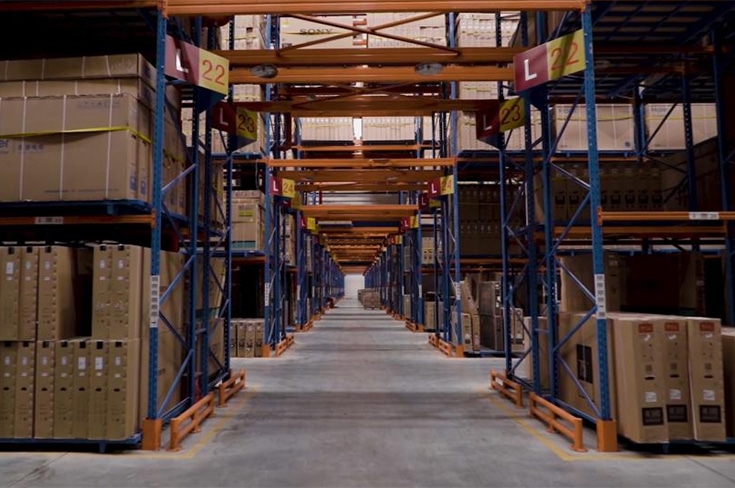In today’s fast-paced and ever-evolving business landscape, digital logistics warehouse management in China services are becoming increasingly vital. However, despite their growing importance, several myths and misconceptions persist, deterring businesses from fully embracing these advanced systems.
Apart from the warehouse service, digitization of supply chain management is also important to take your business to the next step. This blog aims to debunk some of the most prevalent myths about digital logistics WMS, shedding light on their true capabilities and benefits.

Myth 1: Digital WMS is Too Expensive for Small Businesses
One of the most common myths is that digital logistics warehouse management in China is prohibitively expensive and only suitable for large enterprises with substantial budgets. While it’s true that implementing a WMS involves an initial investment, this cost should be viewed in light of the significant long-term savings and efficiencies that the system can deliver.
Digital WMS can reduce labor costs, minimize errors, improve inventory accuracy, and enhance customer satisfaction. Moreover, many vendors offer scalable solutions tailored to the needs and budgets of small to medium-sized enterprises. Cloud-based WMS options, for instance, offer a lower upfront cost and can be scaled as the business grows, making them an affordable and viable option for smaller businesses.
Myth 2: Digital WMS Are Too Complex to Implement and Use
Another common misconception is that digital logistics warehouse management in China is too complex to implement and use, requiring extensive IT expertise and training. While it’s true that transitioning to a digital WMS involves a learning curve, modern systems are designed with user-friendliness in mind. Many contemporary WMS solutions feature intuitive interfaces, comprehensive training modules, and robust customer support to ease the transition.
Moreover, many digital WMS providers offer implementation support, including data migration, system integration, and employee training, to ensure a smooth transition. By leveraging these resources, businesses can effectively overcome the initial complexities and quickly start reaping the benefits of a digital WMS.
Myth 3: Digital WMS Only Benefit Inventory Management
While inventory management is a significant component of any WMS, digital logistics WMS offers far more extensive benefits. These systems provide comprehensive solutions that enhance various aspects of warehouse operations, including order fulfillment, shipping and receiving, labor management, and even customer service.
For instance, digital WMS can optimize picking routes to reduce travel time within the warehouse, thereby improving order fulfillment efficiency. They can also provide real-time data and analytics, enabling managers to make informed decisions, forecast demand, and optimize labor allocation. By streamlining these operations, digital WMS contributes to overall operational efficiency and cost savings.
Myth 4: Digital WMS Are Only Necessary for Large Warehouses
Many businesses believe that digital logistics warehouse management in China is only necessary for large warehouses with complex operations. However, even small and medium-sized warehouses can benefit significantly from digital WMS. Regardless of the size of the warehouse, managing inventory, fulfilling orders, and maintaining accurate records are critical tasks that can be optimized with a WMS.
For smaller warehouses, a digital WMS can eliminate manual processes, reduce errors, and provide better visibility into inventory levels. This can lead to improved customer satisfaction, as orders are processed more accurately and efficiently. Additionally, digital WMS can scale with the business, providing the necessary tools to manage growth effectively.
Myth 5: Digital WMSs are Inflexible and Difficult to Customize
A prevalent myth is that digital logistics warehouse management in China is inflexible and cannot be customized to meet the unique needs of a business. In reality, modern WMS solutions are highly configurable and can be tailored to align with specific business processes and requirements. Many WMS providers offer modular systems, allowing businesses to choose and implement only the features they need.
Customization options can include workflow adjustments, specific reporting capabilities, integration with other business systems (such as ERP and CRM systems), and even user interface modifications. This flexibility ensures that businesses can leverage a WMS that truly supports their unique operational needs and goals.
Myth 6: Digital WMS Compromise Data Security
With increasing concerns about data breaches and cyber threats, some businesses are wary of adopting digital WMS due to perceived data security risks. However, reputable WMS providers prioritize data security and employ robust measures to protect sensitive information. These measures often include data encryption, regular security audits, secure user authentication, and compliance with industry standards and regulations.
Final wrap-up!
Digital logistics warehouse management services offer a multitude of benefits that can transform warehouse operations, yet several myths and misconceptions continue to deter businesses from adopting these advanced systems. You can contact Moov Logistics for their best services, not just in warehouse management, but also in digitization of supply chain management.

 简体中文
简体中文 Nederlands
Nederlands